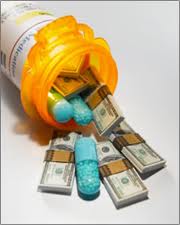 Anyone who has ever had the displeasure of heading to the pharmacy to fill a prescription sans insurance knows that the cost of prescription drugs can be sky-high. If these prescriptions are recurrent and long-term, a patient can spend thousands of dollars on pills alone in a given year.
Anyone who has ever had the displeasure of heading to the pharmacy to fill a prescription sans insurance knows that the cost of prescription drugs can be sky-high. If these prescriptions are recurrent and long-term, a patient can spend thousands of dollars on pills alone in a given year.
 Anyone who has ever had the displeasure of heading to the pharmacy to fill a prescription sans insurance knows that the cost of prescription drugs can be sky-high. If these prescriptions are recurrent and long-term, a patient can spend thousands of dollars on pills alone in a given year. For the insured, the costs are somewhat assuaged by the carrier, but there’s always the good ol’ co-pay to consider. A new study from Medicare was able to shed some light on a rather compelling phenomenon in prescriptions – it looks like now, more than ever, specialty drugs are making the majority of pharmacy costs for patients. They project that by 2018, this very small group of drugs will comprise half of all pharmacy spending.
Anyone who has ever had the displeasure of heading to the pharmacy to fill a prescription sans insurance knows that the cost of prescription drugs can be sky-high. If these prescriptions are recurrent and long-term, a patient can spend thousands of dollars on pills alone in a given year. For the insured, the costs are somewhat assuaged by the carrier, but there’s always the good ol’ co-pay to consider. A new study from Medicare was able to shed some light on a rather compelling phenomenon in prescriptions – it looks like now, more than ever, specialty drugs are making the majority of pharmacy costs for patients. They project that by 2018, this very small group of drugs will comprise half of all pharmacy spending.
Medicare defines ‘specialty’ medication as any drug that costs $600 + per month. This astronomical cost is usually far less about the medication itself, but the handling and storage requirements which far exceed being simply left out on a shelf. These medications may require very specific controlled-temperature storage so that they don’t lose their efficacy, or they may need to be administered via a time consuming or highly specified method.
It’s not that more patients will require these medications, but that the cost of the medications will continue to rise – therefore, they will account for more spending. By 2018, the projected spending for specialty medication alone could be as much as $ 235 million according to Medicare’s study. Even though more patients may not necessarily require the medications, the costs to produce them as the treatments become more targeted and refined, due to technological innovation, will increase. In order to keep up with the latest advancements, the manufacturing of these medications becomes more intense, but the number of patients who will ultimately buy these medications doesn’t increase concurrently.
What about generics? For many patients, the generic version of an otherwise expensive medication is a saving grace; they can still get what they need, but for often half the cost. When it comes to these specialty medications, though, there rarely is a generic alternative – meaning if patients need the prescription, they have to pay – whatever the cost may be. The same goes for insurers. Often, it’s in the best interest of the payer and the patient to choose the generic for its price, but if the patient requires a medication that has no generic formulation, they don’t have a choice. In a way, the specialty market has created a bit of a monopoly – but not intentionally. In order for a medication to have a generic it must be able to be transformed into a biologically equivalent recipe, if you will, and because specialty medications are so much more complex than most medications on the market currently, there isn’t a method for quality control – it’s far too difficult to regulate the production of generics for medications that are so complicated to manufacture in the first place.
It doesn’t always have to break the bank though: patients should be aware that sometimes, physicians have an incentive to prescribe a medication because they buy and administer it themselves – and there could be another, less-expensive option, but they wouldn’t necessarily get the “brownie points” for prescribing that particular medication. Patients can often also save money by administering the medication at home or in their doctor’s office, rather than going to the hospital for it. Incurring extra costs from a trip to the hospital might seem unavoidable for a complex medication regimen, but even the help of visiting home health nurses can allay some of the cost.
Nationwide, we’re continuing to see the numbers of patients with complex, chronic illnesses climbing – so, it’s more likely than ever that specialty pharmacy management and accreditation will become vital to our population health. As the cost of these medications continues to rise, more and more specialty pharmacies will be cropping up around the country. Through proper accreditation, pharmacies can contribute to the education and support of patients who need these costly drugs, and be a trustworthy resource in their community.
Have you recently undergone specialty pharmacy accreditation? Are you considering it? Tweet us on Twitter and let us know!









